I’ve always wanted to play the electric guitar and despite an attempt at doing so over 25 years ago, I gave up. Partially cause I had no sense of time-management (as if I do now), partially cause I always felt that being left-handed and playing a right-handed instrument would always hinder me. And yes, I tried the Jimi Hendrix approach, ending up wrecking my guitar.
This year I decided to try again, but properly - buying a left-handed guitar. While I haven’t been playing for a long time and I’m still below novice, I’ve tried a few different techniques, some have worked, others haven’t. Below is a list of the services/sites I’ve used and my evaluation of them.
Fender Play
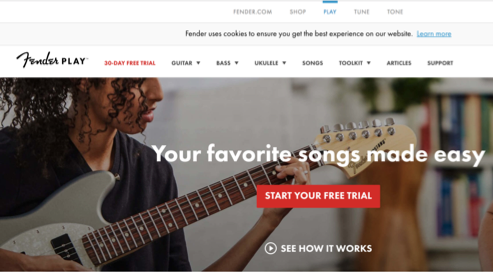
Having purchased a Fender Squire, the first thing I did was follow the marketing material that came with it and signed up to Fender Play. The trial seemed OK but I was so overly excited that I decided to sign up for a whole year. A month later I abandoned.
The Bad
Incomplete. I don’t feel it’s complete. While it has 5 levels, I think it seriously lacks contents.
No learning path. The learning path isn’t really a learning path. While it has support for progress of what you’ve done, etc. I really feel it lacks guidance and proper steps.
No exercises. No real exercises that you’re tested against. I’ll come back this later.
Various instructors. While this has positives, it also feels like it contributes to a lack of continuity.
Unfortunately I’ve signed up for a year, and not much I can do about it, but despite having paid over $100 for this, I just don’t use it and have written it off as a loss.
Verdict. Not happy and wouldn’t recommend it. Having said that, I’ve not gone back to the site for some time so it might have changed a bit for the better.
Yousician
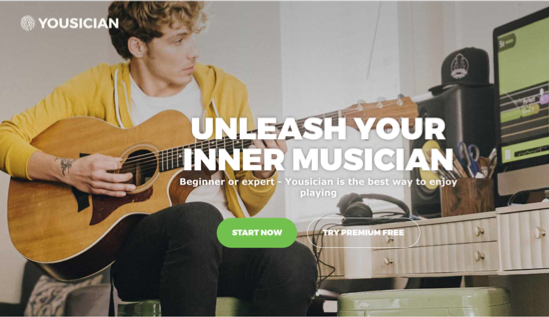
After a hiatus of a few months, partially influenced by my bad experience with Fender Play, I tweeted about my disappointment, and a few people responded recommending I try Yousician.
Best way to describe Yousician is like Guitar Hero but in real life. I immediately got hooked. But this time I didn’t make the same mistake as Fender Play. I did the entire trial period (unfortunately only 7 days) before signing up for a year (I know…).
Different to my last mistake however, I do not regret it. Yousician is excellent and I’m still very much happy with it. A few great things it has:
The good
It’s listening. This is the best feature! It actually listens to you play and tells you if you’re getting the right notes or not. It’s supported on macOS, Android and iPhone, and you can use either a microphone or a device such as the iRig2. The latter is what I use. Connected to an external speaker along with Garage Band, it not only allows Yousician to work, but also provides me an amplifier (well the app does have a built-in amp, I’ve not had good results with it, so I stick to the aforementioned setup).
Learning paths. It has three learning paths:
- Lead. For building up dexterity in your fingers when playing those solos.
- Rhythm. For learning chords, power chords, etc.
- Theory. Some basic music theory
Challenges. It poses new challenges for you and entices you to get to the next level on each path. There are around 16 levels in total and once you reach the same level on each path, you go to the next. Unfortunately though, theory stops at level 6.
Free play. It has a bunch of different songs, including classical, popular, blues and folk that you can play along too. The premium subscription (and I’ll get to this again next) has some additional famous songs. And apparently they’re adding more every day.
Gamification. It’s gamified. I’m not a big fan of this, but if you like it, then great for you. It also allows you to connect with friends, share progress, etc.
Different exercises.. It has a variety of different exercises that help you memorise chord, scales, sliding, hammering, pull-ups, etc. Each dedicated to a single specific task and repetitiveness helps you improve these skills.
Practice and Perform. For every exercise, it allows you to practice and gradually increase the speed. Only when you’re ready you can perform and see if you pass. The increase of speed I’ve found extremely useful.
The bad
I can’t play a thing. This is a sentiment that I’ve been feeling for some time now and shared by a few other people that are using it. While using Yousician, you feel like you’re drastically advancing and getting strength in fingers and speed, without it it feels like I have no idea on how to play the guitar (apart from knowing the chords, some scales and power chords, etc.). In other words, put me in front of Yousician and I can play pretty decently. Take it away and I can’t even play Happy Birthday (OK that one I can actually).
Fret positions, not notes. Your typical interaction with Yousician looks like this:
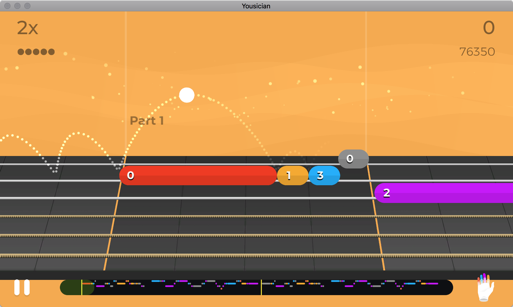
and when you first start, this is how to play. The numbers indicate the fret (0 being open string) and the colour, the finger to use. It’s great. It really helps you build up speed and but it’s also an issue (which contributes to the one above). You don’t really understand what note you’re playing.
Now, of course, Yousician allows you to use a different style such as combining note with number, or even use music notation
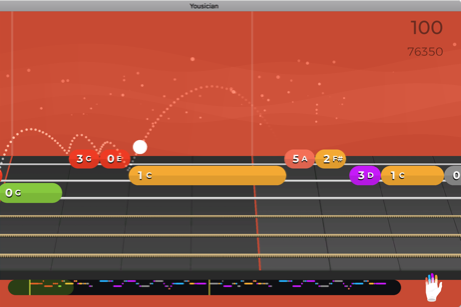
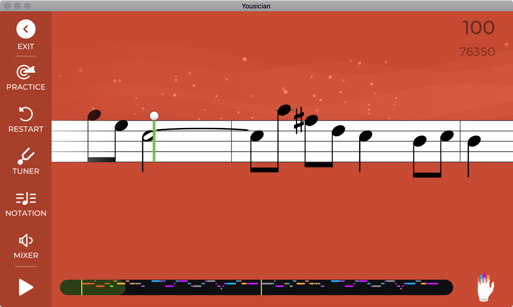
or any combination you can think of…

but the problem is that you start with the first one, find it good, start to advance, and then before you know it, you’re at level 5 and don’t really know what note is on what fret. And while it’s very easy to calculate, you’ve not memorised it.
What I’m now doing is trying to only use notes, no numbers, but it’s not easy and I’ve had to drop down several levels to be able to play fluidly. So take my advice, switch early to notes.
User contributed songs are no more. One cool thing about it was the ability to create your own songs and have others contribute songs. People would upload for instance a Pink Floyd song which you could use to learn. Unfortunately they got rid of all of this, promising something better. That better thing is a what I mentioned above - a bunch of famous songs that they’re gradually building up. However, this is not available in all countries, and also requires a Premium subscription (i.e. goes from 9.99 euros a month to 14.99 a month), a subscription which previously was about having multiple instruments. Something tells me that they realised the whole business model of playing multiple wasn’t really working out. It’s a shame to be honest.
Lack of theory. The theory path really lacks contents. It shows you the very basic but stops short of explaining much around music theory.
Verdict. I’m happy with Yousician and do not regret purchasing a subscription. Most likely I’ll renew next year, despite its issues. However, I don’t think it’s enough on its own, which brings me to the next service…
Justin Guitar
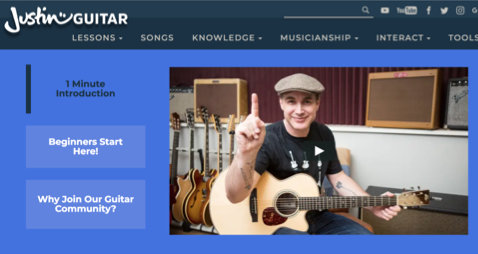
At the same time that they recommended to me Yousician, a few people talked about Justin Guitar.
The bad
I’m going to start with the bad first because it’s actually not entirely bad and there’s a way to solve it when we cover the good.
No forcible progress. Different to Yousician, Justin Guitar is a bunch of content on a site and there’s nothing stopping you from jumping around. There’s also nothing from making you finish a series of exercises before moving onto something else, which I find problematic in learning.
The good
It’s free. Nearly all the contents is free, including videos, exercise outlines, written explanations, etc. You couldn’t ask for more. Justin’s site uses a donation model and he does sell a bunch of different things which I’ll come to in a moment.
Single and awesome teacher. He explains things slowly and clearly and really encourages you to learn and not to feel overwhelmed. Something very important and also not easy to transmit via a video. He does a great job at this and kudos to him for it.
Rich and well structured contents. While similar to Fender Play, in that it’s a web site with contents that you can randomly move around, there are some key differences:
- It feels way more complete and thorough.
- If you create an account with the site, you can mark your progress through the course.
Justin’s song books. While most of the contents is free, including the songs that Justin shows you how to play, the actual songbook with the chord progressions is not. However, they’re not only worth every penny, but they also help support his work, so I thoroughly encourage you to buy them as you progress (I’ve currently purchased the Beginner song book).
The app. Justin also has a few apps. I recently purchased the Justin Guitar Beginner Course. It’s around 65 Euros a year but worth every penny. It helps with the one major issue I have which I pointed out when covering the “The Bad” - forces me through a series of steps. The app provides a bunch of exercises you need to complete to move on to the next step. In addition it has all the songs from the beginner course with step by step notes so that you can play along. They’re not the actual song itself but simplified versions of it. Overall it’s brilliant. About the only thing missing (apart from some usability aspects), is for it to listen to you play like Yousician does.
The theory. Much like the book and the app, Justin also offers a bunch of contents on music theory, but under a paid model. I started reading this and as expected, great explanations, however, for now I’m holding off subscribing because I don’t want to feel overwhelmed with too much at once.
Verdict. Most definitely recommend. However I also encourage you to buy the app, songbook and even theory. Not only do they provide a lot of value, it helps support Justin’s efforts.
Update Tuesday 2nd February 2021
Ben from Strummingly reached out to me recently about the site he’d put together, which has quite a good number of articles about guitar lessons, as well as other resources. Worth checking out.
Update Thursday 29th July 2021
Bella from Musicaroo reached out to me regarding some content they have on their site. Having reviewed it, it does contain some good information, and thus worth linking to.
Summary
I’m far from even considering myself a beginner but I have found a few important things that are helping me, independently of the service/app you may end up using.
Force practice and progress
I’ve tried many times to set myself a schedule of different things I want to practice on paper and then do them. But it just doesn’t work. I keep getting bored and skipping things or just end up playing a bit and putting the guitar down in frustration. Yousician and Justin’s app have forced me into following specific exercises and it really helps me tremendously. If you have the discipline that you don’t need this, then that’s great. When it comes to guitar, I don’t…I keep falling into the trap of wanting to play some solo from Pink Floyd…
Practice daily
Even if it’s just 30 minutes a day, make sure you practice. I travel quite a bit and being away sometimes for a week or more really impacts my progress. I recently, on the advice of Rob Ashton, purchased a travel guitar which I take with me on trips that are longer than a couple of days.
Don’t fall into trap of overwhelming yourself
At some point I decided that I want to understand everything around music theory and started to look into it in more details. It’s definitely fascinating but it’s also not easy, and at times can actually confuse you when learning how to play something. While I’m still very much interested in why some things are the way they are (and understanding how scales are formed, etc.), I’m trying to balance my theory with playing.
More than one method
I’ve reviewed a few different services and while initially I had planned to just stick to one (again to not feel overwhelmed), much like balancing theory, I’m finding that using Yousician and Justin Guitar (especially now with the app) is working out well for me. As such, I don’t think you necessarily have to just stick to one service. But as with many things, this is a personal choice and do what works best for you.
Get a helping hand
Find someone that can help you with questions you may have (especially around theory). I’ve been fortunate enough that Rob Ashton who himself only started playing a few years ago, is always there to help with questions I have. And while sometimes things he answers go over my head, he really does offer me reassurance and help at times.
Record yourself
I admit I should be more active in this but recording yourself can also help show how you’re progressing as well as seeing the mistakes you’re making.
Finally, and more as a reminder and encouragement to myself, when you feel frustrated and you think you’re not making progress, don’t give up. Just keep on playing!